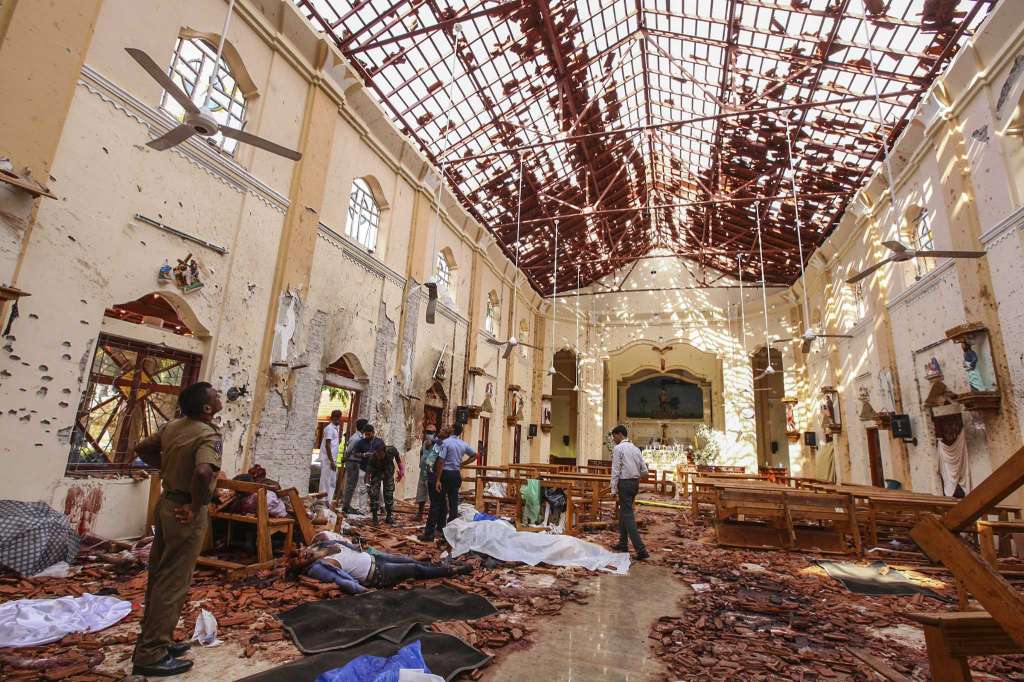Photo: Chamila Karunarathne, AP
Waking to the news of the Easter morning bombings of churches and hotels in Sri Lanka, my reaction was likely different than that of most people around the globe: Buddhist nationalists did this, I thought. The reason I reacted in this way requires some explanation, given the contemporary global and particularly western association of suicide bombings with radical Islamist groups.
Sri Lankans are no strangers to terror. Their long ethno-religious civil war (1983-2009) between the Sinhalese-dominated government and rebel groups associated with the Tamil minority featured both bombings of civilian sites (carried out by the rebels) and state-sponsored massacres of Tamil civilians. Sri Lanka has also known its periods of leftist terror, such as that sponsored by the Marxist-Leninist Janatha Vimukthi Peramuna in the 1970s and 1980s. It is of these periods of violence that many Sri Lankans were likely reminded when they came to know of this weekend’s bombings.
Largescale terror attacks carried out in the name of Islam, however, have not been a feature of Sri Lankan life
Moreover, Christians and Muslims have enjoyed relatively cordial relations in Sri Lanka, in part due to the solidarity of their common victimhood at the hands of Sinhalese Buddhist nationalists, whose supporters—often Buddhist monks themselves—seek to ensure both their ethnic and religious dominance by targeting the island nation’s religious minorities.
In the past decade, Sri Lanka’s Christians have experienced dozens of violent attacks and incidents of harassment and discrimination each year at the hands of Buddhist nationalists (see the periodic “Incident Reports” from the National Christian Evangelical Alliance of Sri-Lanka). The nation’s Muslims have also been regularly targeted by Buddhist nationalists, such as in a series of riots centered on the towns of Ampara and Kandy in February and March of 2018. (Incidentally, Facebook and other social media sites were used to spread false information and provoke these riots, which is why the government moved so quickly to squelch access to social media in the wake of the Easter massacre.)
It is for these reasons that I initially presumed the perpetrators of the recent suicide bombings were Buddhist. If Buddhists had been responsible for the attacks, it would have certainly represented a significant escalation in the scale and tactics of Buddhist nationalist violence. But the targeting of Christians would have also made some modicum of local sense.
The targeting of Christians (and the foreign and wealthy patrons of upscale hotels) by Muslims, however, makes sense only within an international grammar that had been, until last weekend, unfamiliar to Sri Lankans. The fact that it has been introduced is troubling, not only for the fact that Sri Lankans must now fear yet another source of terror, but also because the attacks are likely to strengthen the hand of hardline Buddhist nationalists, who, emboldened by this attack, may be baited into contributing to a cycle of violence and retribution while further impinging upon the rights of Sri Lanka’s religious minorities.
As the New York Times rightly reported, the attacks in Sri Lanka occurred within the context of a regional rise in interreligious and anti-minority violence. This rise is related, significantly, to a concurrent increase in the social and electoral power of ethno-religious nationalist groups across the region.
Observers have already pointed out some similarities between the bombings in Sri Lanka and a terror attack mounted against Mumbai by the Lashkar-e-Taiba in 2008, which largely focused on high-end hotels and the usual haunts of foreign tourists (perhaps in order to increase international coverage). But there are other similarities between the Sri Lankan and Indian incidents. The Bharatiya Janata Party, which rules India and is currently awaiting the results of nationwide elections, is openly associated (along with its prime minister, Narendra Modi) with the Hindu nationalist Sangh Parivar. The Sangh Parivar has a long history of stoking anti-Muslim and anti-Christian violence to create Hindu unity for electoral gain. Significantly, despite the fact that I and others estimate that there have been several hundred annual incidents of anti-Christian violence in India over the last two decades, and that Modi has rarely denounced those that have taken place under his rule, he quickly condemned the attacks on Sri Lanka’s Christians. The difference, one suspects, is that the anti-Christian bombings in Sri Lanka are believed to have been carried out by Muslims (which conforms to the Hindu nationalist narrative) rather than by Hindus (which does not).
Sri Lanka’s Muslims were quick to condemn the attacks, but it is likely that the nation’s Buddhist nationalists will use the bombings to stoke fear of its Muslim community as a whole in order to encourage and justify further violence and discrimination aimed at Sri Lanka’s religious minorities. Similarly, India’s religious nationalists, and others in the region (e.g., the Buddhists who drove out Myanmar’s ethnic Rohingya Muslims), are unfortunately likely to do the same.
Chad M. Bauman is Professor of Religion and Chair of the Department of Philosophy, Religion, and Classics at Butler University and a Senior Fellow at the Religious Freedom Institute.
THE RFI BLOG

Myths of Religious Nationalism in America and Abroad

France’s Olympic Hijab Ban Violates International Law And Exacerbates Tensions

RFI Briefs USCIRF on Lessons from 25 Years of U.S. Designating Religious Freedom Violators

Thought Police: Protecting the People from Prayer

A Religious “Delaware”: Establishing a State Haven for Religious Corporations
CORNERSTONE FORUM

Challenges to Religious Freedom in Iraq and the Critical Need for Action

Public Bioethics & the Failure of Expressive Individualism

Religious Liberty in American Higher Education

Scotland’s Kate Forbes and the March of Secularism


